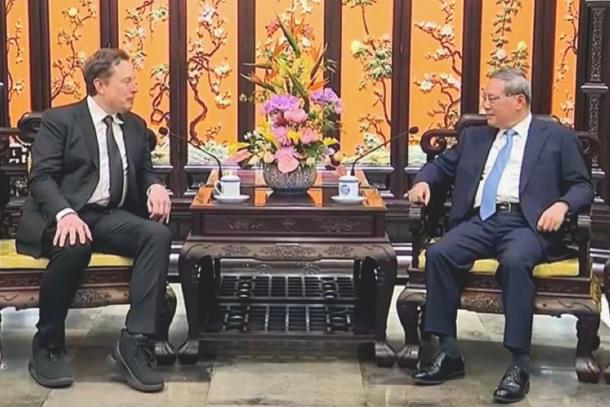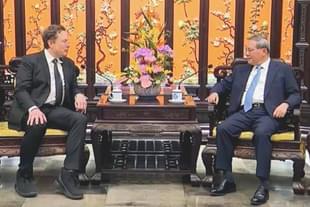Business
'Profound Threat To US National Security': Elon Musk’s Deep Ties With China Under Fire Amid Trump 2.0 Role
Kuldeep Negi
Nov 20, 2024, 12:26 PM | Updated Nov 22, 2024, 06:49 PM IST
Save & read from anywhere!
Bookmark stories for easy access on any device or the Swarajya app.


Elon Musk's role in Donald Trump's upcoming administration is facing criticism amid concerns over potential conflicts of interest.
A US senator has cautioned that Musk's business links to China could threaten American national security.
“I think it is beyond dangerous. I think it is a profound threat to our national security that Mr. Musk and SpaceX are in this position,” said Richard Blumenthal, chairman of the US Senate judiciary subcommittee on privacy, technology and the law.
Donald Trump has announced that Musk will co-lead a government efficiency agency focused on overseeing changes to regulations as well as potentially massive cuts to federal agencies.
Tesla produces half of its vehicles in China, a market that also accounts for a third of its total sales.
Simultaneously, the US Defence Department and other federal agencies are becoming increasingly dependent on SpaceX, another company headed by Musk.
Reports suggest that Musk’s strong business relationships with China and senior officials, such as Premier Li Qiang, may position him as an informal communication link to Trump during the initial days of the administration.
At a Tuesday hearing on US tech companies and their ties with China, Senator Richard Blumenthal expressed concern that Musk's connections to Beijing could be leveraged against American interests.
“Those extensive economic ties and China’s willingness to exploit them are a dangerous combination, a real risk to this country,” Blumenthal said.
He added that Musk and Tesla “are far from the only ones in Big Tech facing this situation.”
Isaac Stone Fish, CEO of the New York-based consultancy Strategy Risks and a witness at the hearing, agreed that Tesla's reliance on China is a significant concern.
“It’s a very, very difficult position for Mr. Musk to be in,” said Fish. He added that Beijing “loves to use corporate leverage” over US companies and individuals to advance its national security interests.
“Frankly, I don’t know how Mr. Musk can balance the interests he has with the US government, with Tesla and with SpaceX at the same time. It’s very, very challenging,” he said.
The hearing, focused on examining cybersecurity threats from China, takes place amid rising concerns in Washington about Chinese espionage activities, which senators and industry experts claim are growing increasingly advanced.
US authorities warn that China could infiltrate vulnerable infrastructure networks, including airports and power grids, and may launch disruptive cyberattacks during significant conflicts or a potential attack on Taiwan.
In October, The Wall Street Journal had reported that Chinese hackers breached several US telecom firms, including AT&T and Verizon, possibly accessing court-approved network wiretapping data.
Adam Meyers, cybersecurity firm CrowdStrike's senior vice-president, testified before the panel that China’s espionage capabilities span “operational advancements, enhanced technical capabilities, and considerably greater alignment to formal national political games.”
“Today, Chinese threat actors operate complex, sophisticated, obfuscated and highly effective cyber operation campaigns targeting every region and every industry vertically,” he said.
Meyers said that his Texas-based cybersecurity firm had observed a rise in China-backed cyber espionage campaigns over the past 18 months.
He said that these campaigns were “likely intended to collect strategic intelligence, compromise intellectual property and advance targeted group surveillance” and included a cyber espionage group called Vanguard Panda.
Meyers revealed that Vanguard Panda had targeted “US critical infrastructure, potentially to pre-position disruptive or destructive capabilities in advance of a future conflict.”
Meyers also provided information on Liminal Panda, a China-linked state-sponsored group allegedly focused on exploiting global telecommunications infrastructure.
Before the US election, The New York Times reported that Chinese hackers had targeted data from phones used by Trump, his running mate Senator J D Vance, and Democratic candidate Vice-President Kamala Harris.
However, a spokesperson for the Chinese embassy in Washington had denied the allegations at the time, claiming that Beijing had no plans to interfere in US elections, which it described as an American domestic matter.
The spokesperson further accused the US of spreading “all kinds of disinformation about the so-called Chinese hacking threats.”
“Such allegations are full of malicious speculations against China, which China firmly opposes," the spokesperson added.
Also Read: WhatsApp Parent Firm Meta To Appeal CCI's Rs 213 Crore Penalty Order—All You Need To Know
Kuldeep is Senior Editor (Newsroom) at Swarajya. He tweets at @kaydnegi.





